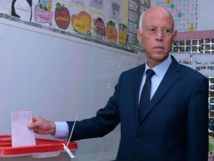"The percentage of voter participation increased in the last hours of the balloting," the election commission head Nabil Baffoun said in a press briefing after the polls closed.
The turnout stood at 35 per cent as of 5 pm (1600 GMT), an hour before the voting ended.
Around 7.2 million people were eligible to vote in around 4,567 polling stations across Tunisia in the single-day balloting.
Vote count started after the polls closed. Official results are expected by Tuesday amid expectations that there will be no outright winner in Sunday's round.
Voter turnout in Tunisia's 2014 presidential election reached 62.9 per cent.
Sunday's presidential elections, originally scheduled for November, were pushed forward after Tunisia's first democratically elected president, Beji Caid Essebsi, died in July, five months before the end of his term.
Twenty-six contenders are vying for presidency.
Front-runners include incumbent Prime Minister Youssef Chahed, the deputy head of the influential Islamist Ennahda movement, Abdelfattah Morou, and former defence minister Abdelkarim Zbidi.
Also running is media magnate Nabil Karoui, who was arrested last month on charges of money laundering and tax evasion.
Academic Kais Saied is also standing as an independent.
If there is no outright winner in the vote, there will be a second round, likely to be held next month.
Tunisia has struggled with an economic slowdown, social unrest triggered by the 2011 uprising that toppled long-time autocrat Zine El Abidine Ben Ali, and subsequent extremist attacks.
The unemployment rate in Tunisia stands at 15.3 per cent.
Some voters expressed hope that the polls will reshape the country for the better.
"I hope there will be change," said Mourad Razki, a state worker, after voting in Tunis.
"I hope the new president will be acquainted with the country’s hard economic situation and the tough living conditions of people," he told dpa.
Kheir Eddin Abadli, a first-time voter, had similar wishes.
"For sure, I am not happy about the current governing scene. I look forward to change," the 19-year-old man said.
Authorities said they had deployed about 100,000 security personnel to secure polling stations across the country, which has experienced a string of terrorist attacks in recent years, mostly claimed by Islamic State militants.
Tunisia, the birthplace of the Arab Spring revolts, is widely seen as the sole democratic success story of the 2010-11 uprisings.
The country has been under pressure from international lenders, mainly the International Monetary Fund (IMF), to take drastic measures to revamp its economy.
The IMF, which in 2016 approved a four-year loan of about 2.8 billion dollars for Tunisia, said this year that Tunisia's economy had improved since 2017.
However, Tunisia still needs to decrease its fiscal and external deficits and reduce inflation.
--------------------------------------------------------------------------------------------------------------









 Home
Home Politics
Politics











